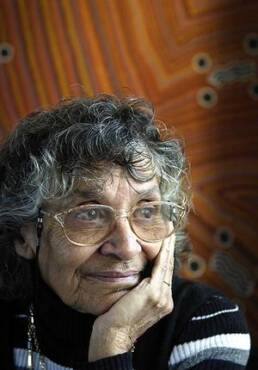These stories may contain descriptions of childhood trauma and abuse. Aboriginal and Torres Strait Islander people should be aware that this website may contain images, voices or names of people who may have passed away. If you need help, you can find contact details for some relevant services on our support page.
Prominent Aboriginal historian, writer and activist, Doreen Kartinyeri (1935-2007), was in residential care as a child.
Doreen Maude Kartinyeri, a Ngarrindjeri woman, was born in 1935 at the Point McLeay Aboriginal Mission Station to Thelma and Oscar Kartinyeri. The Point McLeay Aboriginal Mission Station was established in 1859 at Lake Alexandrina in South Australia, approximately 100km south-east of Adelaide. It was returned to the Ngarrindjeri people in 1974 and called Raukkan from 1982.
Thelma Kartinyeri died in childbirth in 1945 and Doreen was sent to the Salvation Army Home in Fullarton, Adelaide. Doreen found it difficult at the Home: she did not like the military-style in which it was run and complained about having to repeat two years of schooling. When Doreen protested, she was made to do domestic work in the Home.
Doreen was expelled from the Home in 1949 because she was fighting with older girls. She was then sent by the Aboriginal Protection Board to work at Joan and George Dunn’s home in the Adelaide Hills. Two years later, she began to work for the Dunn’s friends, the Motterams, where her principal responsibility was to act as Mrs Motteram’s companion.
Doreen returned to Point McLeay in 1950 to care for her unwell grandmother. There, she did domestic work for the superintendent of the mission and gave most of her pay to her grandparents who, because they were Aboriginal, were ineligible for the age pension. She also cared for several of her young cousins.
After she married Terry Wanganeen in 1954, Doreen and Terry lived on the Point Pearce Aboriginal Station on the Yorke Peninsula, over 190 km north-west of Adelaide and home to the Narungga people. The couple had nine children and fostered others, as many as twenty-three over the years.
It was while living at Point Pearce that Doreen began collecting the genealogies of histories of Aboriginal families of both Point McLeay and Pearce.
She worked as a genealogist with Professor Fay Gayle at the University of Adelaide from 1979 and in 1983 published Rigney Families, a genealogy of the Rigney family compiled with Milton Gale. She followed this with a genealogy of the Wanganeen family in 1985, of the Kartinyeri family in 1989, and of the Rankine and Wilson families in 1990.
While working on the genealogies, Kartinyeri was also setting up (with the help of Steve Hemmings, Curator of Ethnology) the South Australian Museum’s Aboriginal Family History Unit.
During the 1990s, Kartinyeri was involved with controversy when developers proposed a bridge connecting Hindmarsh Island or Kumerangk to the mainland at Goolwa, approximately 85 km south of Adelaide. Along with other Ngarrindjeri women, Kartinyeri protested the development of the bridge because of the cultural significance of the site to the Ngarrindjeri people. After an initial ban of twenty-five years on building the bridge, the Federal Court overturned the ban and the bridge was opened in 2001.
In 1994, Doreen Kartinyeri was named South Australian Aboriginal of the Year and the following year was awarded an Honorary Doctorate by the University of South Australia.
Ngarrinderi Nation (2006) was the final genealogical book published by Doreen Kartinyeri. It contains a genealogy of the Aboriginal families descended from the Ngarrindjeri people of South Australia. My Ngarrindjeri Calling, Doreen Kartinyeri’s memoir, was published in 2008.
References
“Kartinyeri, Doreen Maude (1935-2007).” Indigenous Australia, National Centre of Biography, Australian National University. https://ia.anu.edu.au/biography/kartinyeri-doreen-maude-17798
“Point McLay Mission Station (1859-1974).” Find and Connect. https://www.findandconnect.gov.au/guide/sa/SE01329
“Point Pearce Aboriginal Station (1915-1972).” Find and Connect. https://www.findandconnect.gov.au/guide/sa/SE01332
Rowse, Tim. “Knowing and not knowing: The Ngarrindjeri dilemma.” Life Writing, vol. 7, no. 3, (2010): 245-258.
“The Salvation Army Girls’ Home, Fullarton (1945-1969).” Find and Connect. https://www.findandconnect.gov.au/guide/sa/SE00136
Image available here.
